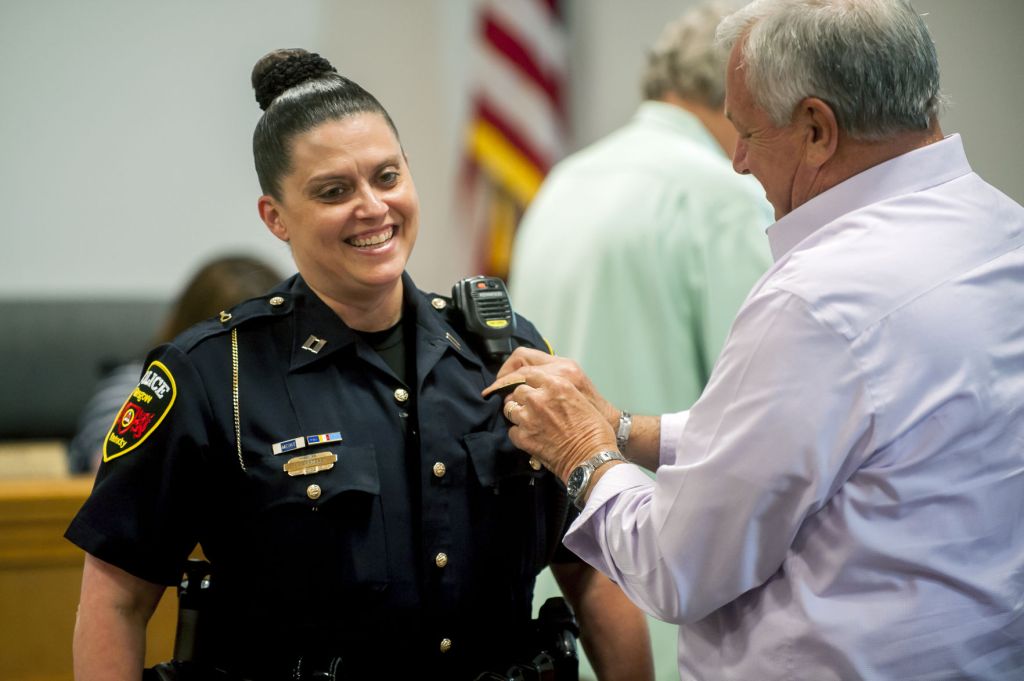Glasgow chief discusses body cameras, other policies
Published 8:00 am Wednesday, September 16, 2020

- Glasgow Police Department’s new chief, Jennifer Arbogast (left), is congratulated Monday, July 8, 2019, by retiring chief Guy Howie at Glasgow City Hall. Additional photos are at bgdailynews.com.
GLASGOW – Glasgow Police Chief Jennifer Arbogast on Monday night summarized the Glasgow Police Department’s body camera policies to the city council, which also approved new police policies and procedures.
Amid high-profile cases of alleged police misconduct across the nation, Glasgow Councilman Joe Trigg asked Arbogast to give the report.
Trigg said it would be a good idea for the police chief to give a report on the police department’s body camera policies. “And to make the public aware that we have them,” he said.
Arbogast said body cameras are given to police officers so they may collect evidence that can be used in the prosecution of law violators. The body cameras are also used for police officer evaluation and training and to provide accurate documentation of law enforcement and citizen interaction, she said.
It is the police officers’ responsibility to make sure their body cameras are in proper working order, Arbogast said. “It’s your duty and your job to check your equipment prior to going out on the street and doing your job,” she said.
Nearly every uniformed police officer wears body cameras, and they are to wear them at all times while on duty.
“I think there are two people in the department who don’t wear body cameras, and that is myself and the major,” Arbogast said. “There’s times when I will grab one and put one on. Another officer may be standing there and I may be actually in the front line of it and I may say: ‘Let me see your body camera.’ And I will put it on me so it will give the best view of whatever situation we were in.”
Arbogast also listed when police officers are required to record with body cameras: traffic stops, any contact with citizens, foot pursuits, investigations, if they arrest someone or if they are searching a vehicle.
There are instances in which police officers are allowed to mute their body cameras, such as when speaking to the police chief and when personal information is about to be revealed. The police officer’s body camera will continue to record, but no one can hear what is being said between the two who are being recorded, she said.
Police officers working as undercover officers don’t wear body cameras. If a police officer is speaking to an undercover officer, he may mute his body camera audio to protect the undercover officer. Such an instance may involve an undercover officer working for the Barren River Area Drug Task Force, she said.
If a body camera video is not needed as evidence, it will be deleted in 90 days, she said.
“If it is something that is needed for a case, something we have to keep, we lock it and … it will not come off unless the case is completely closed and sometimes it doesn’t come off then,” Arbogast said.
The police officers’ body camera videos are reviewed every 30 days. The police officers are chosen at random by their supervisor. The body camera videos are reviewed as part of a training exercise to help the police officers do their jobs better, she said.
City Attorney Danny Basil asked Arbogast if she thought having body cameras were useful in helping her to run the department.
“Absolutely. … It cuts down on the complaints,” she said, adding it also helps clear up certain situations.
The council also approved on second reading an ordinance amending the police department’s standard operating procedure relating to duty to intervene, early intervention, search and seizure of residences, response to resistance and firearms and ammunition.
Basil read a summary of the changes to be made to the police department’s policies and procedures. In the section regarding the search and seizure of residences, the no-knock entry has been eliminated, he said.
“There’s a very, very limited circumstance where that might be appropriate,” Basil said.
In the section of the document that relates to the duty to intervene, a police officer now has the right to intervene if he thinks someone, including a fellow officer, is doing something that may violate a person’s civil rights, he said, adding police officers did not have the duty to do this in the past.
Three new firefighters were also sworn in during the meeting. They are Bo Turner, Tyler Dubre and Jordan Keen.
The council also approved on first reading an ordinance setting the 2020 tax rates and approved on second reading an ordinance increasing the city’s occupational and net profits tax rates from 1.5% to 1.75%.





